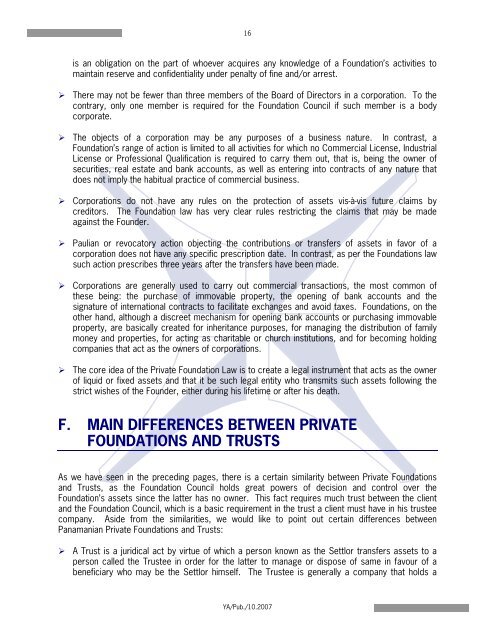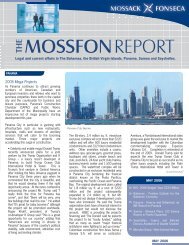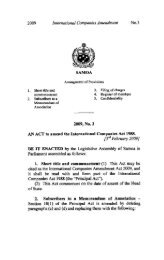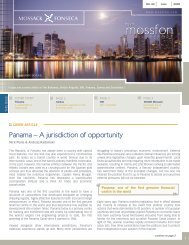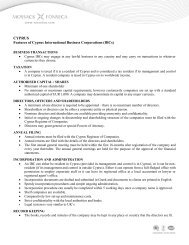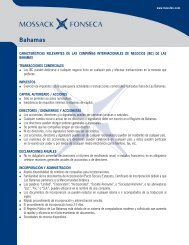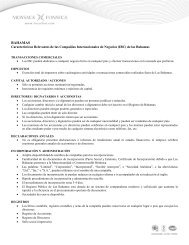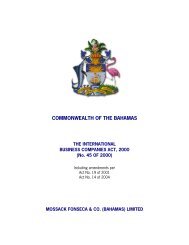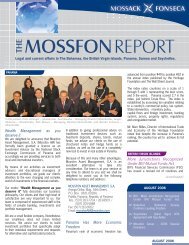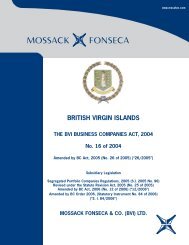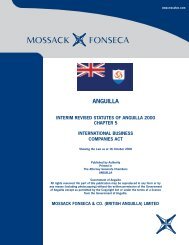Private Foundations.pdf - Mossack Fonseca & Co.
Private Foundations.pdf - Mossack Fonseca & Co.
Private Foundations.pdf - Mossack Fonseca & Co.
Create successful ePaper yourself
Turn your PDF publications into a flip-book with our unique Google optimized e-Paper software.
16<br />
is an obligation on the part of whoever acquires any knowledge of a Foundation’s activities to<br />
maintain reserve and confidentiality under penalty of fine and/or arrest.<br />
There may not be fewer than three members of the Board of Directors in a corporation. To the<br />
contrary, only one member is required for the Foundation <strong>Co</strong>uncil if such member is a body<br />
corporate.<br />
The objects of a corporation may be any purposes of a business nature. In contrast, a<br />
Foundation’s range of action is limited to all activities for which no <strong>Co</strong>mmercial License, Industrial<br />
License or Professional Qualification is required to carry them out, that is, being the owner of<br />
securities, real estate and bank accounts, as well as entering into contracts of any nature that<br />
does not imply the habitual practice of commercial business.<br />
<strong>Co</strong>rporations do not have any rules on the protection of assets vis-à-vis future claims by<br />
creditors. The Foundation law has very clear rules restricting the claims that may be made<br />
against the Founder.<br />
Paulian or revocatory action objecting the contributions or transfers of assets in favor of a<br />
corporation does not have any specific prescription date. In contrast, as per the <strong>Foundations</strong> law<br />
such action prescribes three years after the transfers have been made.<br />
<strong>Co</strong>rporations are generally used to carry out commercial transactions, the most common of<br />
these being: the purchase of immovable property, the opening of bank accounts and the<br />
signature of international contracts to facilitate exchanges and avoid taxes. <strong>Foundations</strong>, on the<br />
other hand, although a discreet mechanism for opening bank accounts or purchasing immovable<br />
property, are basically created for inheritance purposes, for managing the distribution of family<br />
money and properties, for acting as charitable or church institutions, and for becoming holding<br />
companies that act as the owners of corporations.<br />
The core idea of the <strong>Private</strong> Foundation Law is to create a legal instrument that acts as the owner<br />
of liquid or fixed assets and that it be such legal entity who transmits such assets following the<br />
strict wishes of the Founder, either during his lifetime or after his death.<br />
F. MAIN DIFFERENCES BETWEEN PRIVATE<br />
FOUNDATIONS AND TRUSTS<br />
As we have seen in the preceding pages, there is a certain similarity between <strong>Private</strong> <strong>Foundations</strong><br />
and Trusts, as the Foundation <strong>Co</strong>uncil holds great powers of decision and control over the<br />
Foundation’s assets since the latter has no owner. This fact requires much trust between the client<br />
and the Foundation <strong>Co</strong>uncil, which is a basic requirement in the trust a client must have in his trustee<br />
company. Aside from the similarities, we would like to point out certain differences between<br />
Panamanian <strong>Private</strong> <strong>Foundations</strong> and Trusts:<br />
A Trust is a juridical act by virtue of which a person known as the Settlor transfers assets to a<br />
person called the Trustee in order for the latter to manage or dispose of same in favour of a<br />
beneficiary who may be the Settlor himself. The Trustee is generally a company that holds a<br />
YA/Pub./10.2007


